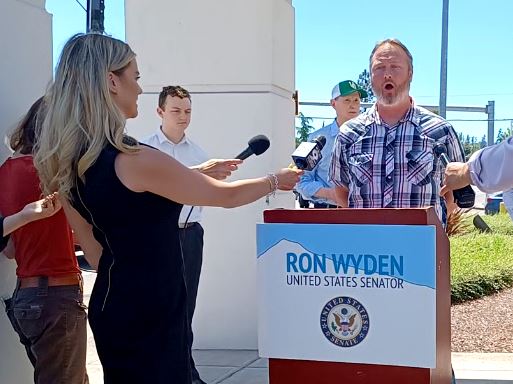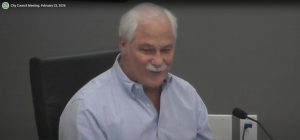Wyden vows to stop wartime profiteering
4 min read
Sen. Ron Wyden said wartime profiteering by the fossil fuel industry is hurting people in Eugene.
[00:00:05] Sen. Ron Wyden: The federal tax code should be helping working families, not just stuffing these subsidies into the pockets of the big oil executives and encouraging profiteering.
[00:00:16] John Q: A University of Oregon student on the GI Bill, Brian Josephson.
[00:00:21] Brian Josephson: My name is Brian Josephson, I’m a born-and-raised Oregonian from Southern Oregon, and when I was 18, I joined the military so I could go and serve my country. Today I am learning at the University of Oregon, I’m going to school on the GI Bill and like many students who I’ve talked to, I don’t live close to campus. Close to campus is expensive.
[00:00:40] So I live further away where the cost of living is a little lower. But with the rising cost of gas, it’s making it really hard for students like me to keep going to school every day. And I’m looking at tough choices, like getting a second job in addition to going to school, just so that I can keep driving to school every day.
[00:01:01] That’s making it really hard for someone like me on the GI bill. You know, my GI Bill doesn’t go up when gas goes up. And so I really think that it is unconscionable that gas is going up on the backs of consumers like that. Oil companies are buying back stock and are giving oil executives big bonuses, while people—veterans, students like me—are paying for high gas prices at that company every day. And so I just want to thank Sen. Wyden for all the work he’s doing for the bill that he has sponsored to keep companies from manipulating their prices, at the detriment of students like me.
[00:01:43] John Q: A parent from the Eugene YMCA, Joe West.
[00:01:47] Joe West: When the gas prices go up, other things are going up. Everything’s going up in price and our world gets smaller and smaller. We want to try to expand that world and show them other things. And it’s harder and harder to afford the niceties of that, because of all the rising gas prices.
Parents have started to reach out to other parents and ask for help with taking kids to school because they can’t afford their own gas or they’re short for the day, they have to wait till payday or they can’t leave their house themselves because they have to prioritize food and things like that for their families as well. I will say it’s really nice that the YMCA does have a local pantry to help the families get food.
[00:02:26] John Q: Sen. Wyden introduced Tom Mulhern from Food for Lane County.
[00:02:30] Tom Mulhern: You know, at Food for Lane County, our focus is on food, not on gas, but the prices of whole food and gas have been going up.
[00:02:36] One of our Meals on Wheels participants recently told us that they are essentially homebound because they can’t afford to go to the store.
[00:02:45] And those meals are delivered by volunteers who use their own vehicles and their own gas to deliver those meals, right. And one of our existing volunteer drivers said that they would be willing to deliver more frequently, but they can’t afford to, because of the price of gas. It just underscores the ripple effect.
[00:03:06] John Q: Sen. Wyden also introduced Brian Steffen from the Eugene Y.
[00:03:10] Brian Steffen: I’m Brian Steffen. I’m the CEO of the Eugene Family YMCA and at the YMCA we are the county’s largest childcare provider…
[00:03:18] At a time when their children are facing the most acute mental health crisis of their lives, their world is getting condensed and shrinking because of the rising fuel cost. Families have difficulty leaving town. They have challenges taking their kids to appointments and adventures. And so their world is getting smaller at a time when they’re already feeling vulnerable and their mental health is being challenged.
[00:03:44] I’ve also talked to families in our Y’s network that we’re serving, who are throughout this community, who are prioritizing getting their kids to camps and after-school programs at the expense of decreasing their time going out of town to jobs, that are even here in Lane County, as close as Cottage Grove or Creswell, where they are reducing the number of times that they’re going into work, just so that they have the funds and resources to take their kids to child-care programs. They’re prioritizing that at the expense of other impacts in their lives.
[00:04:20] John Q: Sen. Wyden said the current system rewards profiteering.
[00:04:24] Sen. Ron Wyden: The way the federal tax code works today, if you’re raking in these huge profits and buying back stock, what the federal tax code says today is: ‘Great, big oil companies, keep doing it and we’re going to keep rewarding you through the tax code.’
[00:04:47] I don’t think that’s right. I think we ought to say, ‘We’re going to make a choice to help people that are standing here with me.’
[00:04:55] And by the way, this is very different than any other approach that’s been tried. What we’re doing is going after specific ripoffs: Stock buybacks, the accounting scams…
[00:05:08] If you believe in markets, as I do, the approach that I’m taking, we’re going to reward the kind of investments that make the market work better, as opposed to what we have today, where when the price of oil goes down, the prices of gas still stay high.
[00:05:26] I think we’ve got a fresh approach here and I, as chairman of the Senate Finance Committee, I’m going to push it very hard.




